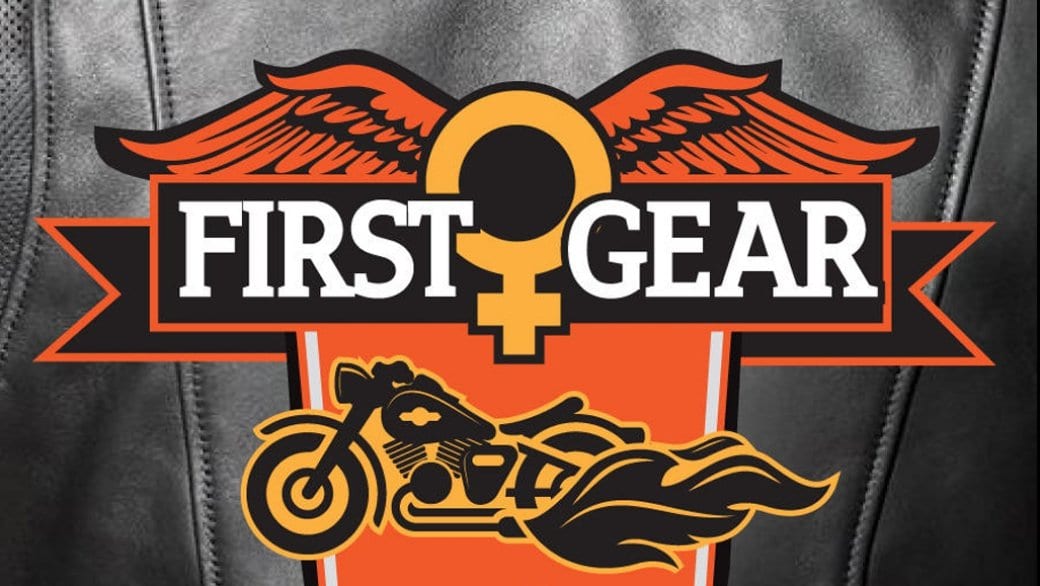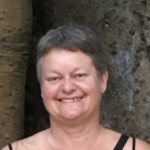Dykes on Bikes are the leaders of so many Pride parades. They were the first contingent before we even had contingents! But who are they, and what lies beneath the surface of those outrageously dressed women riding powerful road rockets?
First Gear is a memoir written by Lorrie Jorgensen from the Ottawa Valley. From the picture on the jacket, she looks like one of us. Read the book and you’ll learn that she is one very brave woman. She’s lived an impressive, but hard life. She’s both brutally honest and entertaining as she leads us down the road of her epic journey, riding a 1600 cc Harley from Ottawa to Winnipeg and back, telling tales as she rolls.
If you’ve not had the pleasure of riding a motorcycle, this one’s for you. Bikers gathered at a Tim Horton’s will say it’s easy to ride. But perils such as hitting gravel, tight turns, a deer or rabbit, or having high beams coming at you in the black of night have taken out many a rider. One has to be cautious while flying free, scared while taking chances, alert when fatigued. Lorrie gives a very real idea of what it’s like to ride — one you can feel.
Her story starts gently as she passes by the old mining towns that are now ghosts, telling tales of places she used to live as a child. It sounds working class and blue collar ordinary — but that’s where many queers come from. How we survive and turn out so very differently from the heterosexual norm is a miracle.
This book, ultimately, is about surviving childhood in a dysfunctional home with an alcoholic mother and abusive father. If you think that says it all, it doesn’t come close. And if it seems that queer kids are more likely to be abused than the others, why is that?
The story turns from an insider’s tale of what it’s really like to ride a motorcycle to an epic internal journey on the road. Multiple sclerosis threatens the ride — one of a list of auto-immune disorders that are common in those who have lived through abuse and survived. On this road trip we learn of her battle as Lorrie attempts a long solo journey. We learn how and why she’s now sober. We get to feel her incredibly warm soul and positive outlook mixed with honest fear. And we learn about the supportive partner at home — a woman, which is how we learn that Lorrie is queer. Like many, she didn’t know she was queer as a child because her world lacked visible role models. It only became legal to be gay in Canada in 1969.
The reader is captivated by pieces of the puzzle, hoping for a successful conclusion to the road trip while trying to figure out what happened back in the family home.
Lorrie couldn’t make it in a skirt, so she fought the battle that many butches have, each one of a kind and alone, and ended up working in auto body repair. She finished her apprenticeship at Algonquin College in 1985, and began teaching at the college in 1989. (She also taught special courses for women entering the autobody trade.) In 2002, she was accepted in the tech ed program of the faculty of education at Queen’s University, where she got her teaching certificate. In 2003, she began teaching high school shop, and ended in the Ottawa-Carleton secondary school system.
By 2010, MS forced her to retire. But she didn’t stop there. She’s still teaching, but now through the written word.
If you took the motorcycle out of this tale it would still be a fascinating memoir that few could have written. The intimacy leaves the reader feeling like they’ve made a new friend. But the adventure by motorcycle exposes the full gamut of what it’s like to fly down the highway, soaring like a bird. When you next see those Dykes on Bikes at the Pride parade, you will have a clue of what many have gone through to get where they are, like the leather men and women, the drag queens, and those visible on the sidelines, joyfully waving rainbow flags. Lorrie Jorgensen has faced adversity with dignity and courage, and weaves an impressive tale.


 Why you can trust Xtra
Why you can trust Xtra


